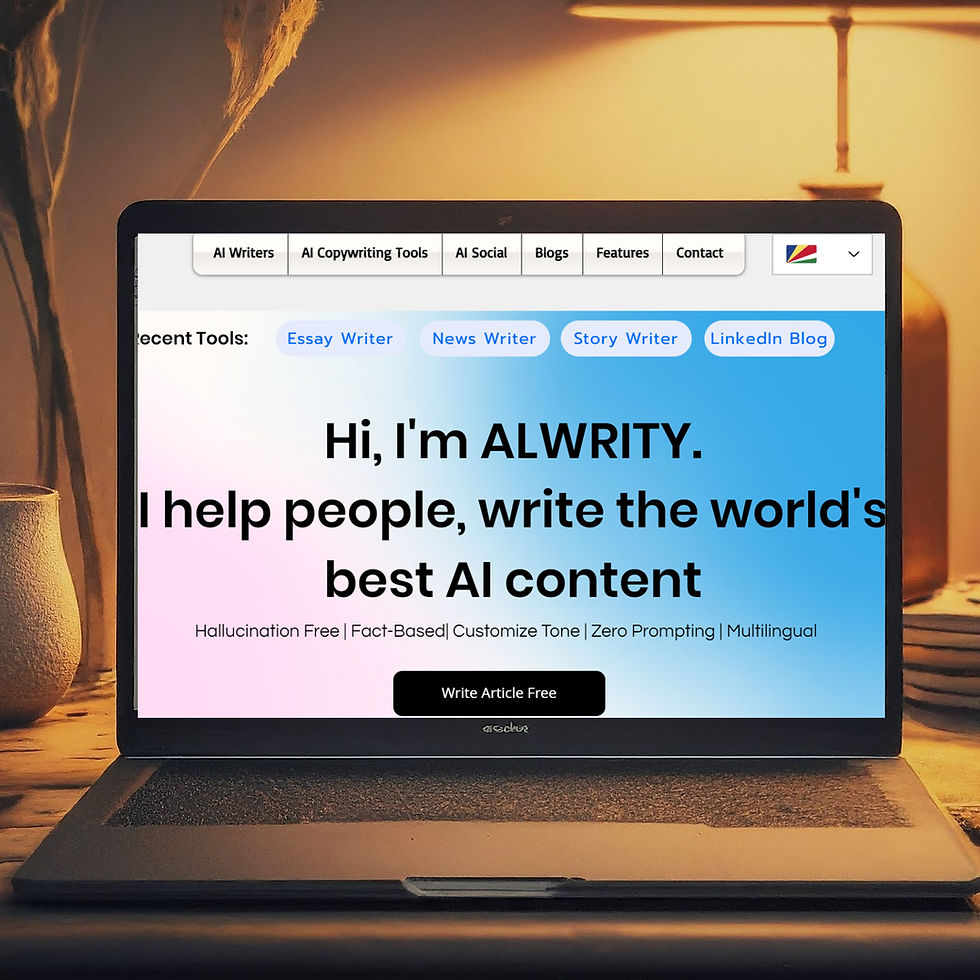Decoding the AI Writer Hype in 2024
- DikshaAI
- Jun 21, 2024
- 5 min read
The robots are writing! Okay, maybe not full-blown novels (yet), but AI writers are taking the content world by storm, and for good reason. These digital wordsmiths can crank out everything from catchy social media captions to full-blown blog posts (like this one!), freeing up your time and maybe even sparking some creativity.
But with lots of AI writing tools popping up like mushrooms after a digital rain, it can be overwhelming to know where to start. Fear not, fellow content creators! This guide will demystify the different types of AI writers and help you find the perfect digital sidekick for your needs.
Table of contents:

1. The All-Rounders: GPT-4 and its Content-Generating Cousins
Think of GPT-4 as the rockstar of the AI writing world. It's the brain behind some of the most powerful and versatile tools out there, capable of generating human-quality text in a snap. These tools are like Swiss Army knives for content, tackling everything from blog posts and articles to poems and even code.
Example:
Imagine you need to whip up a quick blog post about the benefits of AI for small businesses. A GPT-4-powered tool can analyze a simple prompt like "Write a blog post about how AI can help small businesses" and generate a structured, informative, and even engaging piece in minutes.
Pros:
Versatility: They can handle a wide range of writing tasks.
Speed: Say goodbye to writer's block; these tools churn out content at lightning speed.
Idea Generation: Stuck on a topic? These tools can help brainstorm ideas and outlines.
Cons:
Potential for Blandness: While improving, the writing can sometimes lack a human touch or unique voice.
Fact-checking is Crucial: Always double-check the accuracy of the information generated.
Ethical Considerations: The potential for misuse, such as generating spam or plagiarism, is a concern.
2. The Specialists: Tailored Tools for Specific Writing Needs
Not all content is created equal. Just as you wouldn't hire a novelist to write ad copy, there are AI writing tools that specialize in specific types of content.
Example 1: Jasper and Alwrity.com
Jasper: Excels at long-form content like blog posts, articles, and even scripts.
Alwrity.com: A master of short-form content, perfect for crafting compelling ad copy, social media posts, and website content.
Example 2: AI-Powered SEO Tools
These tools analyze keywords, search trends, and competitor content to help you create SEO-optimized pieces that rank higher in search results.
Pros:
Targeted Expertise: Delivers high-quality content tailored to specific needs.
Time-Saving: Streamlines the writing process for specific tasks.
Improved Results: This can lead to more effective marketing copy or better SEO performance.
Cons:
Limited Scope: May not be suitable for all types of writing.
Learning Curve: Some tools require time to master their full functionality.
3. The Writing Assistants: Polishing Your Prose to Perfection
Think of these tools as your personal grammar gurus and style editors. They analyze your writing, identify areas for improvement, and suggest changes to enhance clarity, grammar, and overall readability.
Example: Grammarly and Alwrity
These popular tools catch typos, grammar errors, and stylistic inconsistencies, helping you produce polished and professional writing.
Pros:
Improved Writing Quality: Catches errors you might miss and suggests improvements.
Enhanced Clarity: Helps you communicate your ideas more effectively.
Learning Tool: Provides valuable feedback to help you improve your writing skills over time.
Cons:
Can Be Overly Prescriptive: Sometimes suggests changes that alter your intended voice or style.
Limited Creative Input: Primarily focuses on editing and refining existing content.
4. The Niche Players: AI Writers for Specific Industries and Use Cases
As AI evolves, we're seeing more specialized tools designed for specific industries or tasks.
Examples:
AI for Legal Writing: Tools that help lawyers draft contracts, briefs, and other legal documents.
AI for Medical Writing: Assists healthcare professionals in generating accurate and compliant medical reports.
AI for Creative Writing: Tools that provide prompts, generate story ideas, or even help overcome writer's block.
Pros:
Industry-Specific Expertise: Tailored to the unique language and requirements of a particular field.
Increased Efficiency: Automates repetitive tasks and improves productivity.
Cons:
Limited Availability: There may not be a wide range of options for every industry.
Cost: Specialized tools can be more expensive than general-purpose AI writers.
5. The Future of AI Writing: What's Next?
The world of AI writing is constantly evolving. As technology advances, we can expect even more sophisticated and specialized tools to emerge.
Here's a glimpse into the future:
Increased Personalization: AI writers that can adapt to your unique writing style and voice.
Enhanced Creativity: Tools that can collaborate with writers on a deeper level, generating more original and imaginative content.
Ethical and Responsible AI: A greater focus on developing AI writing tools that are used ethically and responsibly.
Frequently Asked Questions: Addressing Your AI Writing Queries
1. Will AI writers replace human writers?
It's unlikely that AI will completely replace human writers. While AI is great at generating text quickly and efficiently, it still lacks the creativity, empathy, and nuanced understanding of human language that makes for truly compelling content. Instead, AI writers are best viewed as powerful tools that can augment and enhance human creativity.
2. How can I ensure that the content generated by AI is high quality?
Always fact-check and edit the content generated by AI. Think of it as a starting point that needs your human touch to refine and perfect. Look for tools that offer plagiarism detection and ensure that the writing aligns with your brand voice and style.
3. What are the ethical considerations of using AI writing tools?
It's essential to use AI writing tools ethically and responsibly. Avoid using them to generate spam, plagiarize content, or spread misinformation. Transparency is key – be upfront about your use of AI writing tools, especially when publishing content.
4. What are the best AI writing tools for beginners?
For those just starting out, user-friendly tools like Grammarly (for grammar and style) or Alwrity.com (for short-form content) are great options. These tools offer intuitive interfaces and helpful resources to guide you.
5. How can I integrate AI writing tools into my existing workflow?
Start by identifying areas where AI can save you time and improve your writing. Experiment with different tools to find ones that fit your needs and workflow. Many AI writing tools offer integrations with popular platforms like WordPress and Google Docs, making it easy to incorporate them into your existing processes.
The Bottom Line: Embrace the Power of AI Writing
AI writers are here to stay, and they offer a wealth of benefits for content creators of all levels. By understanding the different types of AI writing tools available, you can choose the perfect digital sidekick to elevate your content, boost your productivity, and unlock new creative possibilities. So, embrace the future of writing and see what AI can do for you!





Comments